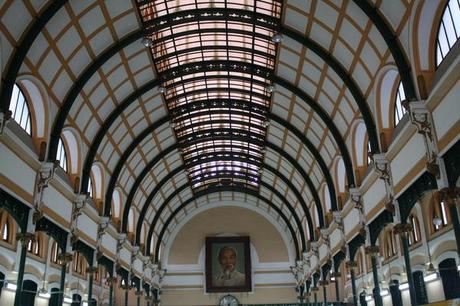
Saigon’s stunning old post office
Traveller vs tourist. It’s an age-old debate.
Tourists, obviously, are the ones who cling stubbornly to the beaten path, wear knee high socks (apparently) and walk around with their noses in guidebooks. Travellers are the ones with dreads, who’ll sleep anywhere, who eat strange foods and learn local phrases.
So the stereotypes go, and so the battle lines are drawn.
It’s difficult to write about this without seeming to come down on one side or the other. But I’m going to try to dive in, objectively.
See, I’ve been pondering the differences between a holiday (or vacation) and travel. Cambodia deeply affected me, and some of the comments on my post indicate that my reflections were somewhat off-putting from the other side.



The way they were phrased got me thinking. No, I wouldn’t say Cambodia is top of mind for most people when they think “holiday destinations”. But what constitutes a holiday?
To me, a holiday is all about hedonism. Sunbathing. Swimming. Eating. Sightseeing. Maybe a spot of shopping.
Cambodia is hot (though I wouldn’t sunbathe there). There’s swimming to be done, though not in the main cities. Eating, certainly, and sightseeing. But Cambodia, for me, was not about holidaying, but experiencing. Taking a step back in time at Angkor Wat. Sampling the local food, which is simple by necessity, but none the less delightful for it. And yes, that includes seeing what life on the ground is like, if only in tiny glimpses.
I knew that I would witness hardship and poverty in Asia. Life is not always polished to a brilliant shine. I can understand why people might not want to see that side of it, though. My mother only likes happy movies; on the other hand, while I find it difficult to watch films about (or that include) terrible things – war, genocide, rape, terminal illness – I also find them to be the most rewarding, when done well. Think The Boy in the Striped Pyjamas, The Reader, Boys Don’t Cry.
Yet we all have to draw the line somewhere. For me, it was the Killing Fields. I couldn’t stomach the thought of laying eyes on human skulls. For T, it was the Cu Chi tunnels, with their decades of bad juju (and I must admit, I have my own deep issues with small spaces). These are must-see tourist sights for most, but as it turned out, not for us.
Getting off the beaten track is something most of us at least pay lip service to. For a moment, I gave serious thought to booking ourselves a river tour, culminating in an overnight stay with a “sweet Vietnamese family”, according to the booklet. Something about the idea felt a bit off, though. As appealing as a local homestay might sound, the forced authenticity made me uncomfortable. (Meeting up with local Couchsurfers proved a better way to connect.) And while it didn’t end up working out, we almost signed on for a three-day motorbike tour that promised sightings not just of the stunning Danang coast from the mountains, but swimming in waterfalls and sightings of local villagers going about their daily lives (hamstrung, sadly, by T coming down with his first serious stomach woes). We missed out on that, but in hooning around Hue and surrounds on a motorbike, we at least managed to see plenty of real houses and real families in passing.
Tourist or traveller? In trying to draw the lines for myself, I came across this gem of an idea from Jetlag Manifesto – that tourists travel to escape the world, while travellers travel to experience the world.
Maybe at its simplest, holidaying is easy, while travel is challenging.
Does that sound condescending? I hope not. I LOVE holidaying. Most of my trips to date have been pure, unadulterated holidays; sunning and funning rate very highly in my books. I genuinely do not see travellers as being inherently superior to tourists. Some prefer the structure and safety of guided tours. Some prefer to brave the local public transport. It’s all about different styles. For what it’s worth, I think we straddle the line, but probably still come down more heavily on the tourist side.
Do travellers have a monopoly on fun? Maybe tourists will never have an ‘authentic’ experience, but does it matter if that’s not really what they desire? After all, in the words of Anthony Peregrine: “There’s no moral or qualitative hierarchy of holiday pleasures”. What matters, as Joel Runyon points out, is that you make your trip memorable. (Amen.)
Only you can decide how to best achieve that.
